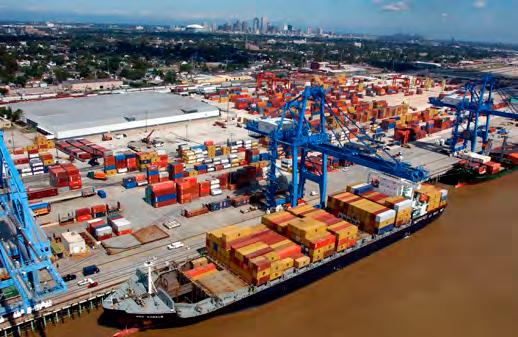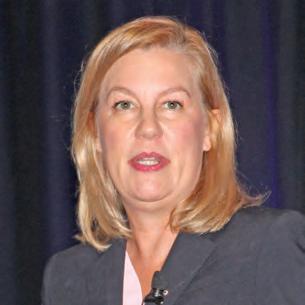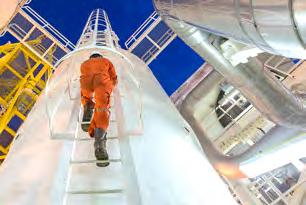
9 minute read
ICYMI
LAUNCH
ICYMI
A different kind of oil in the pipeline
PIPELINE OPERATOR Kinder Morgan Inc. plans to convert some Louisiana tank and piping infrastructure to hold used cooking oil and other feedstocks for Finnish renewable-fuels giant Neste.
The two companies announced this fall they plan to create a premier domestic raw material storage and logistics hub in the United States, supporting increased production of renewable diesel, sustainable aviation fuel and renewable feedstock for polymers and chemicals.
Upon completion of the project, Kinder Morgan’s Harvey, Louisiana facility will serve as the primary hub where Neste will store a variety of raw materials—including the used cooking oil it collects from more than 40,000 restaurants across the United States.
Kinder Morgan is one of North America’s largest energy infrastructure companies; Neste, one of the leading providers of renewable and circular solutions.
As part of the initial, committed phases of the project, Kinder Morgan will modify existing tanks and piping to enable segregated storage for a variety of raw material across 30 tanks.
The scope of work also includes the installation of a new boiler for heating tanks and railcars and infrastructure improvements for rail, truck, and marine movements.
The project, which is supported by a long-term commercial commitment from Neste, is expected to begin operations in Q1 2023. At Neste’s option, the facility can be further expanded.
“This clearly shows the positive role America’s existing energy infrastructure can play in creating a sustainable future and fighting climate change,” Neste President Jeremy Baines says.
The commitment is one of Neste’s largest to date in the U.S., building on the company’s more than 15-year head start in creating an end-to-end renewable product value chain.
Renewable fuels offer an immediate way to reduce greenhouse gas emissions from aviation and heavy-duty road transport.
Neste says its renewable feedstock for polymers and chemicals manufacturing can also significantly reduce the carbon footprint of the end products.
As one of North America’s largest terminal operators, Kinder Morgan Terminals brings to the table 80 million barrels of storage, 266 docks, 462 truck bays and 6,800 rail car spots.
Because renewable products work with existing energy infrastructure, the U.S.’s vast network of pipelines, storage tanks, and distribution sites can be used to rapidly scale their availability.
The companies contend this will enable renewable products to replace fossil products faster and more affordably.

GREEN BARGES
GALLIANO-BASED Crosby Tugs has invested in green shipping start-up Float Freight, a sustainability-focused barge transportation company that harnesses the industry’s latest technology to provide carbon-neutral inland marine transportation solutions.
The companies say that Float Freight will work with the Crosby Group’s existing marine asset network along with a team of dedicated engineering, operational, and commercial support staff.
Float Freight now offers multiple weekly sailings on fixed schedules and what it calls “friendly” booking terms. Based in Houston and Galliano, the company will initially offer direct service from New Orleans, Mobile, and Cameron, as well as Mexico.
“We aim to make the U.S. Marine Highway system accessible for any size company by providing low cost and predictable inland marine solutions,” Float Freight Managing Director Mike Little says.
Float Freight’s services include low-cost transshipment and direct discharge options for the project, heavy lift, bulk, breakbulk, and container sectors. The company also can support clients that need more of a “just in time” arrival schedule, or clients that require dedicated assets for their cargo.
AN LNG BUNKERING DEAL
FOR NEW ORLEANS
THE PORT OF NEW ORLEANS has signed a deal for LNG bunkering.
The memorandum of understanding between Port NOLA and CLEANCOR creates a strategy for the two entities to collaborate on ways to provide liquefied natural gas fueling for ship owners and operators.
CLEANCOR, an alternative energy company, will work with Port NOLA to help provide LNG to port customers and marine operators in Port NOLA’s jurisdiction. Port NOLA will provide CLEANCOR with data, logistics expertise, customer contacts, as well as introductions and marketing support.
“We are pleased to partner on this MOU with CLEANCOR to ensure we provide Port NOLA tenants and customers with the best options for the most efficient and effective operations,” said Brandy D. Christian, president and CEO Port NOLA and CEO of the New Orleans Public Belt Railroad. “LNG paves the way of the future and provides a suitable and sustainable fuel source for the diverse cargo operations on our terminals and in our jurisdiction.”
CLEANCOR will work to educate Port NOLA customers and other local stakeholders regarding the environmental and financial benefits of LNG bunkering. In collaboration with Port NOLA, CLEANCOR will develop options for infrastructure development that integrate into Port NOLA’s long-range planning.
“CLEANCOR is proud to partner with the Port of New Orleans on the development of LNG bunkering infrastructure,” said CLEANCOR CEO Jeff Woods. “Our mission is to accelerate the adoption of low carbon fueling solutions and this constitutes an exciting opportunity to not only advance the region’s first such project, but also to contribute to the decarbonization of the maritime sector.”
CLEANCOR will also provide options for LNG bunkering that are compatible with forecasted customer demand and collaborate with Port NOLA to obtain federal, state, and other authorizations and permits needed to develop the required infrastructure and operations.
Both CLEANCOR and Port NOLA will identify, attract and serve customers in Port NOLA’s jurisdiction that use LNG fuel, jointly solicit sources of grant funding to help incentivize early adopters and collaborate to share information on infrastructure necessary to support LNG bunkering.
A proposed expansion of the Port NOLA complex with the addition of an international container terminal in St. Bernard Parish opens opportunity for new businesses and industries as well as fuel source options.
This alignment builds upon Port NOLA’s already existing strategic relationship with SEACOR to provide one of the country’s largest container-on-barge operations.
The service between Baton Rouge, New Orleans, Memphis and St. Louis continues to thrive and offers shippers an option for moving their cargo. The service repositions empty containers from Memphis and St. Louis to Baton Rouge and New Orleans, where they are loaded with exports and shipped to global markets.

PEOPLE ON THE MOVE

KRISTIN THOMAS-MARTIN has been named manager of ExxonMobil’s Baton Rouge Plastics Plant. She replaces Angela Zeringue, who has been named senior operations planning advisor for ExxonMobil Chemical’s Global Operations. Zeringue will remain in Baton Rouge. A native of Pittsburgh, Thomas-Martin began her ExxonMobil career in 2006 at the Baton Rouge Chemical Plant with a chemical engineering degree from the University of Tennessee. Since 2019, she has been the operations manager at the Baton Rouge Polyolefins Plant. Prior to pursuing a degree in engineering, Thomas-Martin was a classically trained ballet dancer and performed with the Pittsburgh Ballet Theatre. She continues to take and teach ballet classes while working for ExxonMobil.

Cameron LNG CEO FARHAD AHRABI, who orchestrated the creation of the first phase of the company’s first export facility in Louisiana from the construction process to full commercial operations, is retiring at the end of January 2022. He has been with the company for seven years. Under Ahrabi’s leadership, the facility received the Perfect Record Award by the National Safety Council for reaching more than 89 million hours worked without a lost-time incident. The Cameron LNG liquefaction export project reached full commercial operations of Phase 1 in August 2020. To date, the facility has exported more than 240 cargos of U.S. natural gas to 28 countries worldwide.
BY THE NUMBERS
$4 MILLION
Amount of a grant the National Science Foundation is awarding LSU to lead a project to determine the economic viability of CO2 electrolyzers, a process that converts CO2 into the precursor chemicals used in items such as detergents, anti-freeze and tennis shoes.
50 KILOTONS
The future nameplate capacity of methyl acrylate that will be produced at Dow’s St. Charles Operations in Louisiana, set to be online in the first half of 2022, to meet North American demand. Once the new capacity is online, the facility will primarily focus on the production of methyl acrylate and 2-ethyl-hexyl acrylate.
Slippery slope
By SAM BARNES
How to recognize the ethical warning signs

THE ACCOUNTING SCANDAL at WorldCom came to light in the summer of 2002.
For three years, senior executives at the company’s Clinton, Mississippi headquarters perpetuated an unethical and illegal scheme to inflate earnings designed to maintain WorldCom’s stock price.
An internal audit unit led by then Vice President Cynthia Cooper discovered the massive fraud when her team found some $3.8 billion in falsified balance sheet entries.
Eventually, WorldCom admitted that it had overstated its assets by more than $11 billion.
At the time, it was the largest accounting fraud case in U.S. history. Today, Cooper uses the WorldCom experience as a cautionary tale for leadership during regular talks on the subject.
Now president of The Cooper Group LLC of Flowood, Mississippi, she is the inaugural inductee of the Institute of Internal Auditors American Hall of Distinguished Audit Practitioners and the first woman to receive the American Accounting Association’s Accounting Exemplar Award.
Speaking in August at the Construction Financial Management Association’s regional conference in New Orleans, Cooper outlined the warning signs that a leader might be diverging from an ethical path.
“We all face ethical dilemmas every day,” she says. “I don’t think anyone wakes up and says, ‘Hey, I think I’m going to become a criminal today.’ It’s a slippery slope and people go down that slope one step at a time.
“So the decisions we make every day matter. I don’t think our character is forged at the crossroads of some major event. Our character is built decision by decision, brick by brick.”
As such, Cooper lays out some helpful guidelines for ethical leadership:
Know where you stand: “You should write you own personal mission statement and identify how you would like to live your life,” Cooper says. “Identify your values, think about your priorities and be intentional.”
Apply the Golden Rule:
Simply put: Treat others as you want to be treated.
Understand that anyone can make bad decisions:
“Just because it’s legal doesn’t mean it’s the right thing to do.”
Ask tough questions: Perhaps the most
important question: “How

SAM BARNES would you feel if your parents, peers and mentors knew?”
Practice making ethical decisions:
A person’s reality is based upon the small decisions they make every day. It’s a compilation of all those decisions.
Don’t keep it to yourself: Get advice from the people you respect and trust.
Find your inner courage: “I found a way to push forward in the face of fear,” Cooper says. “We all have courage inside of us.”
Apply the same code of ethics
everywhere: “Use the same ethical process, no matter where you are,” she says. “In other words, don’t compartmentalize.”
Trust your instincts:
If something doesn’t feel right, it probably isn’t.
Be loyal to your
principles: Don’t assume that your superiors are right just because they’re in charge.
Cynthia Cooper








